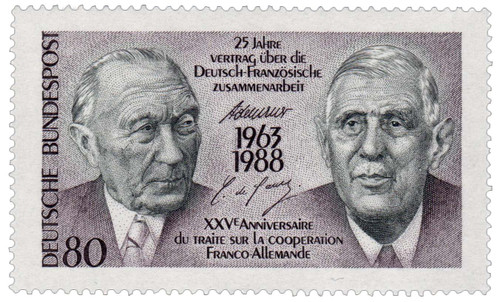
# 57468BP - 1988 Franco-German Treaty Joint Issue Stamp Blocks of 4 in Folio
In 1988, France and Germany collaborated on a pair of joint-issue stamps honoring the 25th anniversary of the Élysée Treaty. This neat folio includes blocks of four of each stamp plus the history behind the treaty in both French and German.
The Élysée Treaty
Since the 16th century, France and Germany were often at odds with each other. Through several wars and incidents, they were often in opposition of each other, creating a long-lasting rivalry that continued into World War II.
World War II began after Germany invaded Poland in 1939. France then declared war on Germany, who in turn invaded France. France then joined in the Allied occupation of Germany. After the war ended, West German Chancellor Konrad Adenauer sought to put an end to the long-standing rivalry and made it one of his major goals.
On January 21 and 22, 1963, Chancellor Adenauer met with French President Charles de Gaulle at Élysée Palace in Paris to discuss a treaty of friendship and amity between their two nations. The result was the Élysée Treaty, which they signed on January 22. The treaty encouraged both nations meet on a regular basis to discuss important issues including defense, education, and youth. It also called for members of the heads of state of both nations to meet at least twice a year and the Ministers of Foreign Affairs to meet every three months to promote cooperation between the two nations. In addition to improving relations between France and Germany, the treaty was also seen as an important step to creating a united Europe.
Just two months after the treaty was signed, a controversy arose. President de Gaulle had hoped that the treaty would encourage West Germany to eventually separate itself from the United States. However, US President John F. Kennedy had voiced his concerns over this. As a result, Germany added a preamble to the treaty that encouraged increased cooperation with the US. De Gaulle was upset over this, but the treaty remained in use.
Over the years, several new organizations were born from the regular meetings encouraged by this treaty. These include the Franco-German Youth Office, the Franco-German military brigade, and the Franco-Germany University. Several Franco-German high schools were also created and many cities in both nations declared “sister cities.”
In 2003, representatives from both nations met in Versailles to celebrate the 40th anniversary of the treaty. These celebrations led to a number of new programs as well, including the Franco-German Ministerial Council and the creation of the Franco-German History Coursebook. They also established the Élysée-Fond, to establish Franco-German culture projects in other countries. Additionally, they made it easier for people to receive double citizenships.
In 2019, German Chancellor Angela Merkel and French President Emmanuel Macron met on the 55th anniversary of the treaty to renew it and deepen their cooperation. This resulted in the Aachen Treaty.
In 1988, France and Germany collaborated on a pair of joint-issue stamps honoring the 25th anniversary of the Élysée Treaty. This neat folio includes blocks of four of each stamp plus the history behind the treaty in both French and German.
The Élysée Treaty
Since the 16th century, France and Germany were often at odds with each other. Through several wars and incidents, they were often in opposition of each other, creating a long-lasting rivalry that continued into World War II.
World War II began after Germany invaded Poland in 1939. France then declared war on Germany, who in turn invaded France. France then joined in the Allied occupation of Germany. After the war ended, West German Chancellor Konrad Adenauer sought to put an end to the long-standing rivalry and made it one of his major goals.
On January 21 and 22, 1963, Chancellor Adenauer met with French President Charles de Gaulle at Élysée Palace in Paris to discuss a treaty of friendship and amity between their two nations. The result was the Élysée Treaty, which they signed on January 22. The treaty encouraged both nations meet on a regular basis to discuss important issues including defense, education, and youth. It also called for members of the heads of state of both nations to meet at least twice a year and the Ministers of Foreign Affairs to meet every three months to promote cooperation between the two nations. In addition to improving relations between France and Germany, the treaty was also seen as an important step to creating a united Europe.
Just two months after the treaty was signed, a controversy arose. President de Gaulle had hoped that the treaty would encourage West Germany to eventually separate itself from the United States. However, US President John F. Kennedy had voiced his concerns over this. As a result, Germany added a preamble to the treaty that encouraged increased cooperation with the US. De Gaulle was upset over this, but the treaty remained in use.
Over the years, several new organizations were born from the regular meetings encouraged by this treaty. These include the Franco-German Youth Office, the Franco-German military brigade, and the Franco-Germany University. Several Franco-German high schools were also created and many cities in both nations declared “sister cities.”
In 2003, representatives from both nations met in Versailles to celebrate the 40th anniversary of the treaty. These celebrations led to a number of new programs as well, including the Franco-German Ministerial Council and the creation of the Franco-German History Coursebook. They also established the Élysée-Fond, to establish Franco-German culture projects in other countries. Additionally, they made it easier for people to receive double citizenships.
In 2019, German Chancellor Angela Merkel and French President Emmanuel Macron met on the 55th anniversary of the treaty to renew it and deepen their cooperation. This resulted in the Aachen Treaty.







